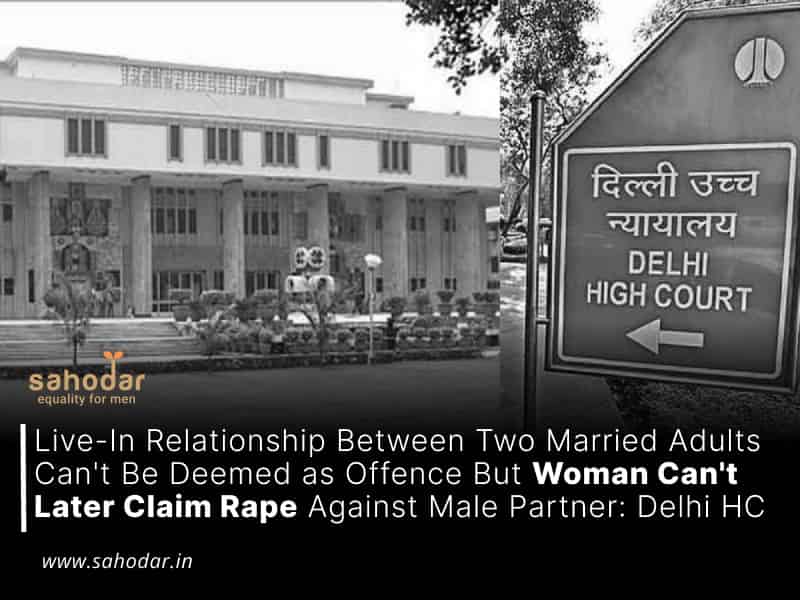A live-in relationship between two adults who are married may be socially unacceptable but it is not an offence, the Delhi High Court recently held.
In the judgment delivered on September 13, Justice Swarana Kanta Sharma said that moral wrongdoing from the societal perspective and legal criminal wrongdoings are two separate issues, and though some in society may heavily be critical of a live-in relationship between two married individuals, many others may not.
The Court said, “Live-in relationship between two consenting married adults, who are married to different partners, has not been made criminal or legislated against. While concluding that legal enforcement of morals has not been legislated against, and cannot be a subject matter of any legal morality preached through a judgment (sic).“
Hence, though judges might have their own views on such relationships, they can’t deem it as an act of criminality to such acts based on their perceived notions of morality, emphasized the Court.
The single-judge bench further stated, “It would be a dangerous proposition to attach criminality to acts that have not been legislated against on the basis of perceived morality. Judges, as individuals, may have different notions of morality, which cannot be imposed on any party.”
Regarding the same, the Court ruled that when a woman is not eligible to marry someone legally due to her existing marriage to another person, she cannot allege rape by claiming that she was induced into a sexual relationship on the false pretext of marriage.
The Court underscored, “The protection and remedies available under Section 376 of the IPC cannot be extended to a victim who was not legally entitled to marry the person with whom she was in a sexual relationship with. A case can be made out under Section 376 of IPC, if the victim can prove that she was induced into a sexual relationship under false pretext of marriage by the other party being legally eligible to enter into a marriage with such person.”
It also opined that individual adults have the freedom to make decisions even though such decisions might not align with societal norms, morals, or expectations. However, in such conditions, they have to be ready to face the potential consequences of such relationship, it added.
The bench made these observations while dealing with a plea filed by a man seeking the quashing of a first information report (FIR) lodged against him for the offence of rape based on allegations of a woman that he established sexual relationship with him on the false pretext of marriage.
It was told to the Court that they were living in a live-in relationship and both were married to different persons.
In his plea and also written submission seeking the quashing of the FIR made against him, the petitioner used derogatory language against the woman.
Justice Sharma said that such submission violates the code of conduct including decency that needs to be followed in legal pleadings.
The judgment said, “Therefore, this Court is of the opinion that although the immorality of the act on the part of the female partner was argued at length before this Court, the same standard applies to the male partner, and no distinction should be made based on gender, as doing so would perpetuate misogynistic thinking.“
Dealing with the issue of both the parties being married to other people but were indulged in a live-in relationship with each other, the Court said that an act may be socially unacceptable but it is not a crime.
Justice Sharma observed, “Courts of law cannot serve as legal moralists preaching morality. They must critically examine the criminal aspects derived from the facts of each case.“
The Court was of the view that women can make choices and that those choices must be given respect, irrespective of the age-old notion of women carrying the burden of morality solely on their shoulders. On the man’s plea to quash the FIR, the Court said that when a woman was not legally eligible to marry someone as she was already married to another person, she could not claim that she was induced into a sexual relationship under the pretext of marriage.
In the case in hand, it was clear that the petitioner (man) could not have entered into a legal marriage with the complainant and there was no firm basis for the complainant to entertain the claim of a promise of marriage from him since she was ineligible to marry him due to her existing marriage.
Subsequently, the Court allowed the man’s plea seeking quashing of FIR registered against him by the woman and thus quashed the FIR.
Advocate S Selva Kumar appeared for the petitioner, S Rajadurai.
Additional Standing Counsel, Rupali Bandhopadhya appeared for the State.
Advocates MD Jangra, Varun Kumar, and Shitanshu appeared for the complainant woman.
Source: https://www.barandbench.com/news/live-in-relationship-between-two-married-adults-not-offence-woman-cannot-claim-rape-delhi-high-court

